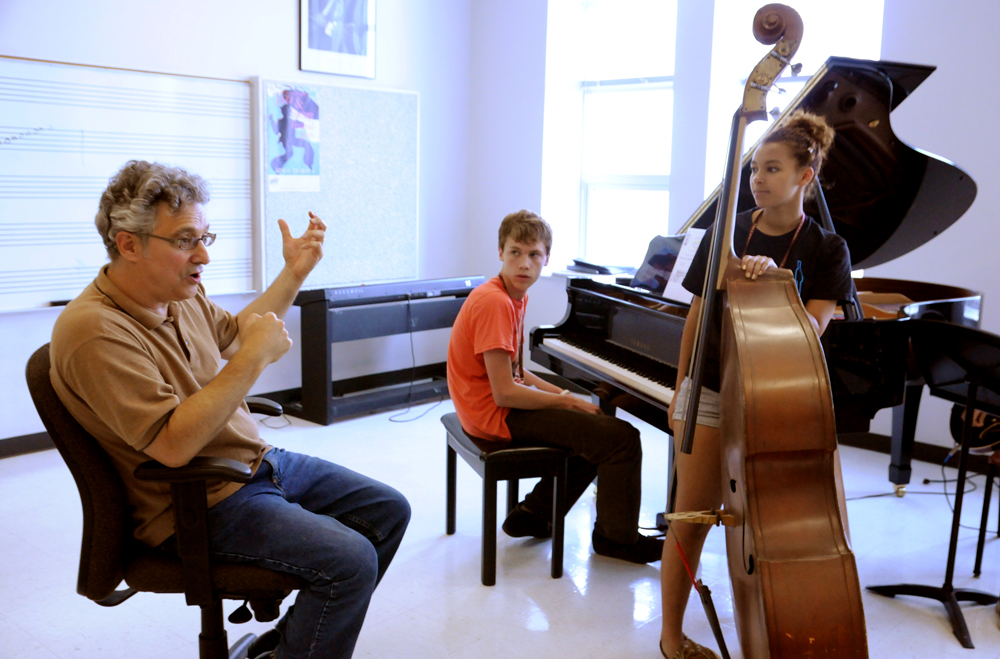Answering a student’s question while visiting NOCCA in the fall, Emmy Award-winning documentary filmmaker Ken Burns simply stated, “If I had not met my photography mentor, you would not be meeting me.”
NOCCA students feel strongly about what it means to study in a master-apprentice environment. “Our faculty are teaching us what they are passionate about,” explains Drama III student Daisy Rosata. “It is vitally important to them and it becomes vitally important to us. They want us to know how to do our art and how to do it well.”
Modeling Professional Expectations
“I love how I was mentored by one of the most important sound engineers in New Orleans,” says Media Arts IV student Paul Schoen who won Downbeat’s High School Best Engineered Live and Studio Recording Awards this year. “My biggest advantage in the professional world is that I’ve done everything from the ground up at NOCCA.”
Jazz IV pianist Tommy Crumrine notes, “One of the most important skills a musician can develop is a good work ethic. In order to be a successful musician, you must constantly practice and stay focused. My teachers really helped cultivate this within me by constantly giving us new material to work on and leading by example.” “Our teachers practice more that we do!” says Jazz IV bassist Austin Clements in awe.
Introducing a young apprentice into one’s own discipline engenders a level of respect and seriousness that allows faculty to push students to both understand and produce their best work. “Everyone – teachers and peers – wants you to succeed; they push you forward,” says Drama III student Devin Williams.
Getting to Know You
NOCCA faculty have a distinct advantage in that they will usually work with students for four years. Moreover, in striving to help students develop their own voices and passions – now in academics as well – teachers develop a deep understanding of students’ interests, potential and goals.
“Being with the same faculty for four years, it is less like a classroom here and more like a family,” finds Drama IV student Austin Thompson. “You grow comfortable in this setting, so you take more risks.”
Not in the Textbook
“What they teach us cannot be found in a textbook,” believes Drama IV student Austin Alleman. “Our faculty know exactly what to expect in our respective fields,” says Musical Theatre IV student Dylan Troost. “We get to learn from their personal experiences, their successes, and their failures.”
Moreover, the large number of mentors teaching NOCCA’s young artists gives them a distinct advantage over traditional classroom environments. Take an Academic Studio/Jazz student for instance. Each year at NOCCA, he will have ten scientists, historians, writers, math specialists and a linguist as academic mentors. He will have five music mentors plus a teacher on his particular instrument. He will learn from twelve to fifteen visiting master artists each year. And he will learn from the work and critique of his peers.
“Being a little bit open-minded brought us to NOCCA,” says Jazz Level IV student Glenn Hall III, “but our approach to life and art opened all the way once we got here.”
Appreciation
NOCCA students quickly develop a deep appreciation for their teachers. “I’ve learned about the selflessness it takes to be a teacher,” finds Jazz III guitarist Dominic Minix. “Our jazz teachers have so much knowledge to share. They could be gigging all year. Instead they choose to teach us. And not just about music but life lessons.”
“Teaching the art of improvisation is an art in itself,” Crumrine gives as an example. “It is really easy to give students a bunch of rules to follow, but when a teacher gives students the tools to truly express him or herself, that is great jazz instruction.”
Asked how many NOCCA students want to teach, a good majority raise their hands. “We watch how Mr. Pellera teaches jazz and learn from example,” says Hall. “My teachers helped me in my studies and by letting me play with them on stage. I plan on giving back by doing the same for the next generation,” says Jazz II student Gregory Gabb who wants to be a performer and educator like his teachers.
The Results
Absorbing the art of critique, students learn to self-correct. Explains Minix, because “you can practice with your bandmates a composition you just wrote, you can immediately know what is not working. We learn to discover for ourselves when we are on the right path.”
“It is a friendly approach to teaching here, but we get a lot done,” says Crumrine. “We don’t worry about grades here,” declares Hall. “The pressure is about getting better.” Echoes Alleman, “you have to get grades here, but it is not about the grades. It is about actually understanding.”
The opportunity to develop with a mentor a passion for exploration – in arts and academics – changes how students view the world and themselves. “When I look at my future, I can make goals,” says Rosata. “They may or may not happen. But I’m not scared of failing. Without NOCCA I would have been too scared to try.”
“The more I know, the more secure I feel,” declares Thompson. Things are more achievable. That’s what one-on-one mentorship taught me.”

